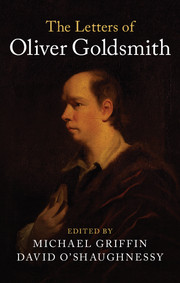48 - To David Garrick, [London, early February 1773]
Summary
Exasperated at Colman's dithering over his comedy, Goldsmith sent a copy to David Garrick, manager of the rival patent theatre, Drury Lane. After discussing this move with the ‘sensible friend’ noted in the letter, he soon repented this fit of pique and requested the return of the manuscript. The identity of the ‘sensible friend’ is unknown, although Johnson must be a very likely candidate; Joseph Cradock and Arthur Murphy, both of whom contributed epilogues, are also possibilities.
The copy-text is the manuscript in the Beinecke Rare Book and Manuscript Library, Yale University. It was first published in James Boaden, The Private Correspondence of David Garrick with the Most Celebrated Persons of his Time, 2 vols. (London: Henry Colburn, 1835), I: 527. It is addressed, ‘To | David Garrick Esqr. | Adelphi.’ and is endorsed in Garrick's hand ‘Dr. Goldsmith's about his play’. The letter is dated 6 February by Boaden but nothing on the manuscript corroborates the date.
Dear Sir
I ask you many pardons for the trouble I gave you of yesterday. Upon more mature deliberation and the advice of a sensible friend I begin to think it indelicate in me to throw upon you the odium of confirming Mr. Colman's sentence. I therefore request you will send my play by my servant back, for having been assured of having it acted at the other house, tho’ I confess yours in every respect more to my wish, yet it would be folly in me to forego an advantage which lies in my power of appealing from Mr. Colman's opinion to the judgement of the town.1 I entreat, if not too late, you will keep the affair a secret for some time. I am Dear Sir
Your very humble servant
Oliver Goldsmith.- Type
- Chapter
- Information
- The Letters of Oliver Goldsmith , pp. 112 - 113Publisher: Cambridge University PressPrint publication year: 2018



